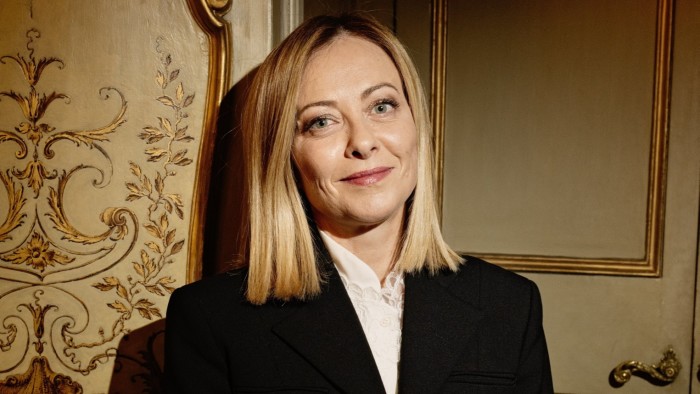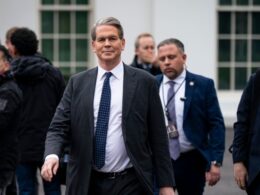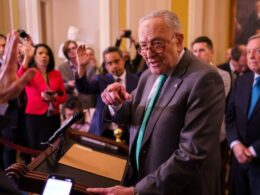Giorgia Meloni has dismissed the idea that Italy will have to choose sides between the US and Europe as “childish” and “superficial”, insisting she would do whatever is necessary to defend her country’s interests.
In her first interview with a foreign newspaper since coming to office in 2022, the Italian prime minister said it was “in the interests of everyone” to overcome severe strains in the transatlantic relationship, describing some European leaders’ reactions to Donald Trump as “a bit too political”.
Italy’s nationalist conservative leader made clear she did not see the US president as an adversary and she would continue to respect Italy’s “first ally”.
“I’m conservative. Trump is a Republican leader. Surely I’m nearer to him than to many others, but I understand a leader that defends his national interests,” Meloni said. “I defend mine.”
At a time of increasing alarm in Europe over the Trump administration, Meloni said many White House complaints about Europe’s trade practices and defence spending simply echoed previous US administrations.
Speaking just hours before Trump announced 25 per cent tariffs on car imports, Meloni said the US had long been pursuing an increasingly protectionist agenda, including with Joe Biden’s Inflation Reduction Act. “Do you really think protectionism in the US was invented by Donald Trump?”
Meloni also said she hoped Trump’s “confrontational” approach on European defence would be a much-needed “stimulus” for the continent to take responsibility for its own security. “I like to say that crisis always hides an opportunity,” she said.
Meloni extolled the political stability she has brought to Italy since her election victory in October 2022, pointing out that she now leads the fifth longest-serving government in her country’s postwar history. Her domination of the Italian political landscape, coupled with relatively prudent fiscal management, has helped reassure financial markets about Italy’s high debt burden.
But Italy, like the rest of Europe, now faces a world order in turmoil, with the Trump administration downgrading its security commitments and declaring economic war on its traditional allies.
That has left Meloni — who has long-standing ties with the US Republican party and was the only European leader to attend Trump’s inauguration — in a particularly difficult political spot. “Our relations with US are the most important relationship that we have,” she said.

During the interview in the prime ministerial offices in the 16th-century Palazzo Chigi, Meloni stressed the importance of avoiding a transatlantic rift, outlining her vision of security guarantees for Ukraine and of a non-confrontational response to Trump’s tariff offensive.
“Italy can have good relations with [the] United States and if there is something that Italy also can do to avoid [a US] confrontation with Europe and to build bridges, I will do that — and it is in the interest of the Europeans.”
Italy’s first female prime minister entered politics as a teenage activist with a fringe, far-right party founded by the surviving comrades of fascist dictator Benito Mussolini. Known for her fiery campaigning style, in opposition Meloni was a fierce Eurosceptic who railed against unaccountable Brussels bureaucrats, criticised Italian leftist “woke politics”, and vowed tough action to stop illegal migration.
Since taking office, Meloni has tempered her message, forging effective working relations with European Commission president Ursula von der Leyen, and reassuring investors with relatively thrifty budget plans. Her efforts to divert irregular migrants to detention centres in Albania have been rejected by the courts, leading to tensions with the judiciary.
Unlike other European far-right leaders — some of whom had historic ties with Russia’s President Vladimir Putin — Meloni was also a strong supporter of Ukraine after Russia’s full-scale invasion.
Meloni has sought to avoid any hint of criticism of the White House, keeping a studiously low profile even as barbs from the Trump administration have been met with outrage by other European leaders.
Meloni even said she sympathised with US vice-president JD Vance’s scathing attack on Europe for allegedly abandoning its commitment to free speech and democracy.
“I have to say I agree,” she said. “I’ve been saying this for years . . . Europe has a bit lost itself.”
Trump’s criticism of Europe was not aimed at its people, but at its “ruling class . . . and the idea that instead of reading reality and finding ways to give answers to people, you can impose your ideology on people”.

While the Commission has pledged to retaliate against Trump’s tariffs, Meloni wants the EU to maintain its composure. “Sometimes I have the impression that we simply respond instinctively,” she said. “In these topics you have to say, ‘Keep calm, guys. Let’s think’.”
In particular, Meloni argued that while overall tariff levels between the US and Europe were roughly equivalent, high duties on some specific items were causing friction. “There are big differences on the single goods,” she said. “That’s what we have to work on to find a good, common solution.”
But she said the EU was held back by the slow pace of its decision-making. “It’s not easy to compete with somebody that in one day can sign 100 executive orders,” she said.
While many in Europe fear that Trump is preparing to coerce Ukraine into an unfavourable peace deal, Meloni has expressed faith in his efforts, while repeatedly emphasising the need for strong guarantees to ensure Russia does not restart the war in future.
She remains sceptical about the French and British proposal for a European “reassurance force” to Ukraine, which she said may be seen by Moscow as a provocation. “We have to be careful here. It can be seen more as a threat,” she said.
Instead, she advocates extending Nato’s Article 5 mutual defence clause to Ukraine — without actually admitting Kyiv into the alliance — which she claims would be “easier and more effective” than other proposals.
The idea has baffled European officials, since collective defence is the essence of Nato and the US has refused to extend such guarantees to Ukraine.
British Prime Minister Sir Keir Starmer and French President Emmanuel Macron have spearheaded efforts to galvanise support for Kyiv, visiting the White House to sway Trump and convening multiple meetings of EU leaders and defence chiefs. Meloni, by contrast, has opted for a more low-key role.
“I’m not interested in saying, ‘I’m the one in the middle, I’m a protagonist,’” she said. “Not now. The stakes are too high.”

Many European governments including Germany are embarking on far-reaching rearmament plans, convinced that, whatever happens in Ukraine, Russia will be Europe’s biggest security problem. Meloni is more equivocal.
Asked whether she regarded Russia as a long-term threat, Meloni replied: “I believe it could be, I think it could. But in any case, I believe we have to find a way to be ready to defend ourselves from every kind of threat that we can have.”
Despite their ideological affinities, Italy is in Trump’s crosshairs given its chronic underspending on defence, which stands at only 1.5 per cent of GDP, well below Nato’s 2 per cent target. Meloni said as a “serious person” who wanted “to represent a serious nation”, she would meet her commitments.
Brussels is relaxing EU fiscal rules to favour defence spending and has proposed a €150bn loan programme for military procurement. But both schemes would increase Italy’s debt pile, already at 135 per cent of GDP, and could push up borrowing costs.
Meloni said it was “a bit concerning” given her efforts to repair the public finances. She also called for the relaxation of the fiscal rules to last longer than four years. Rome would wait to see the final terms of these schemes before deciding how to proceed, she added.
Nodding to Italy’s strong pacifist tradition and the opposition within her own coalition to higher defence spending, Meloni argued that security should be broadly defined, taking in cyber security, illegal immigration and other hybrid threats. Like other Mediterranean countries, Italy is anxious to ensure that threats coming from Africa to Nato members are not ignored.
“You have to understand that the threats can come from 360 degrees. So if you simply think that you can defend yourself, taking care of the eastern flank, and you don’t consider for example what happens in the southern flank, you will have a problem.”
The threat of swingeing US tariffs comes as Italy’s economy is already losing momentum, with economists worrying that Rome is not doing enough to enhance productivity. Italy is also struggling to spend EU funds from the NextGenerationEU programme, having only spent €64bn so far — little more than half the money it has received.
But Meloni said her government was working to attract more foreign investors and backing for transformative long-term projects. That includes efforts to turn Italy into a hub for energy imports from Africa, whose stability and economic prospects Meloni sees as inextricably linked to Europe’s own.
“I don’t simply stay here to make my chair warmer,” she said. “I’m here to do good things for my nation — to leave it better than I found it.”
Source link









